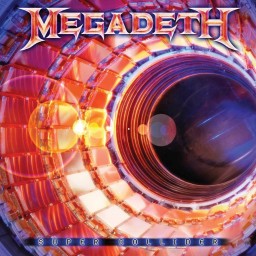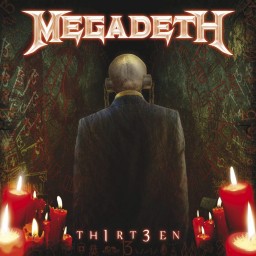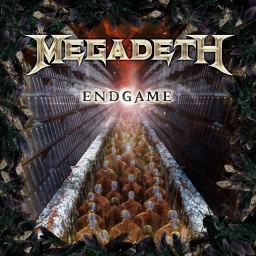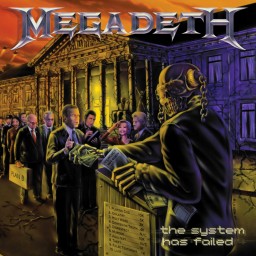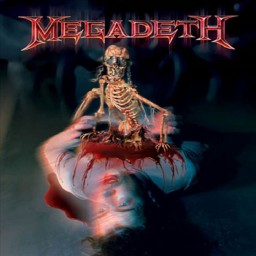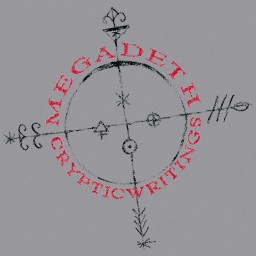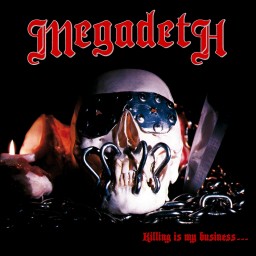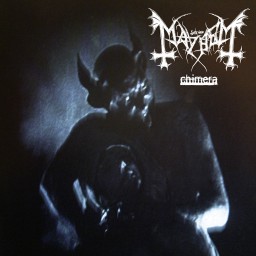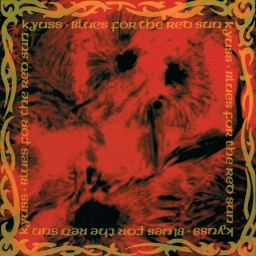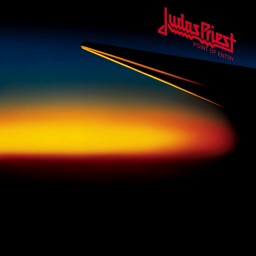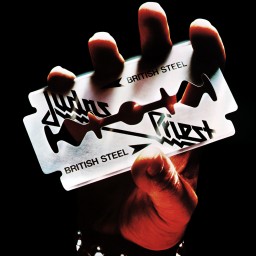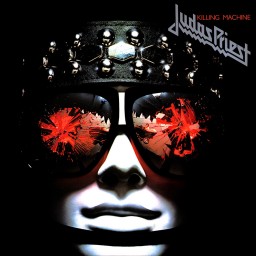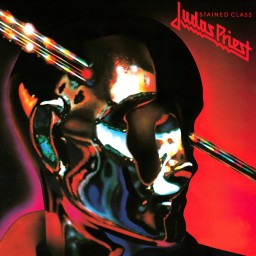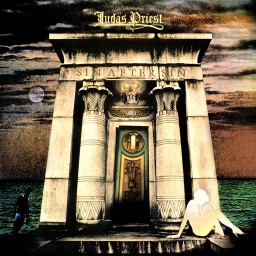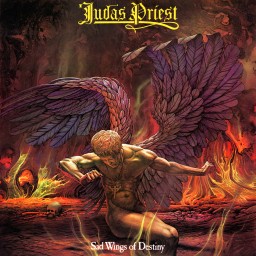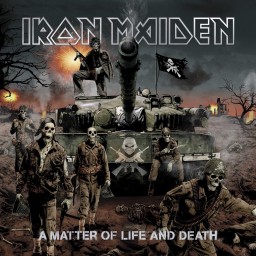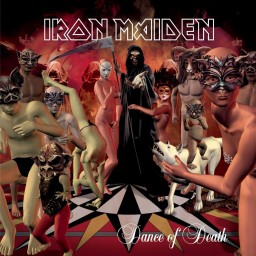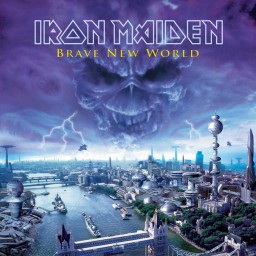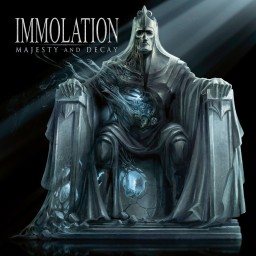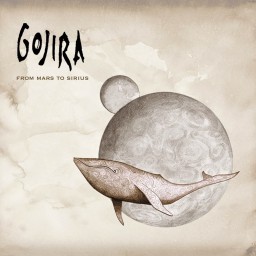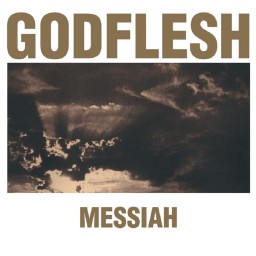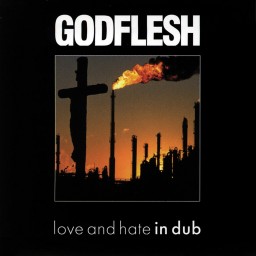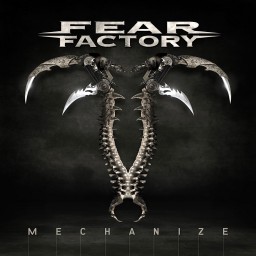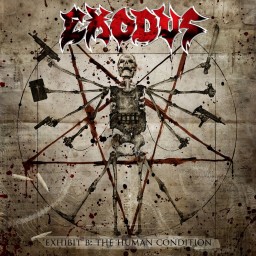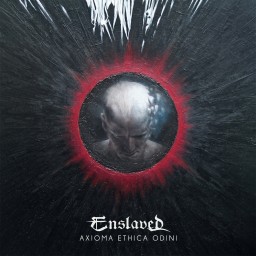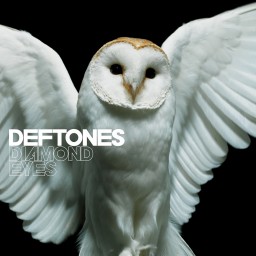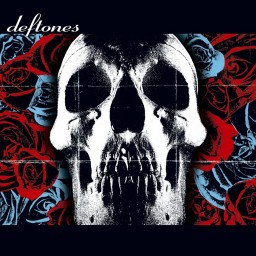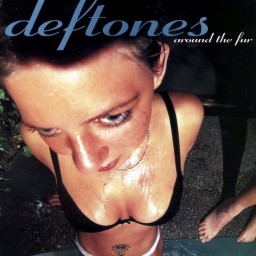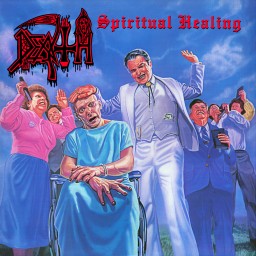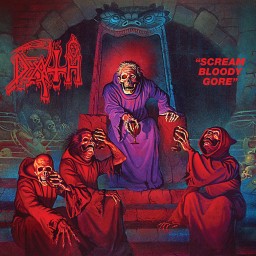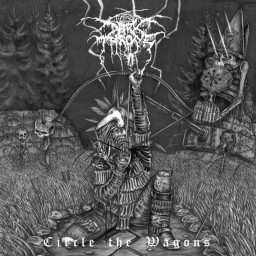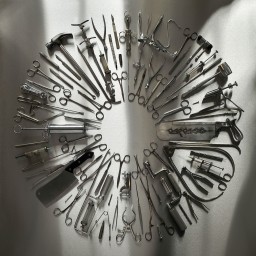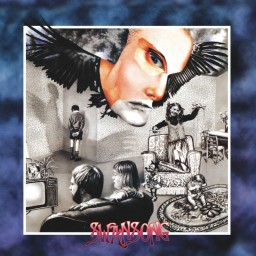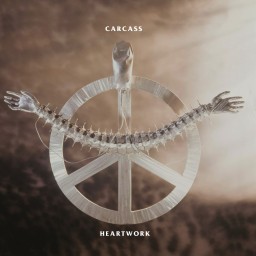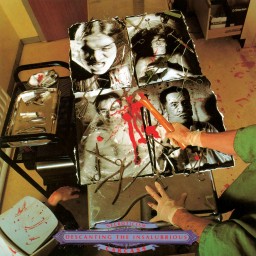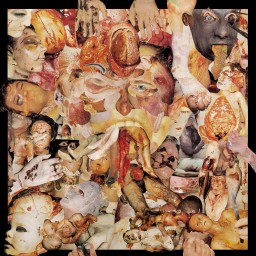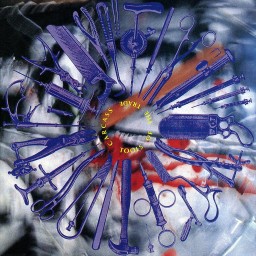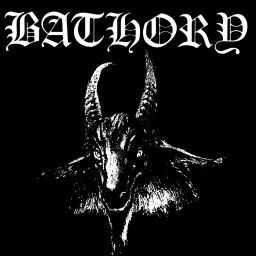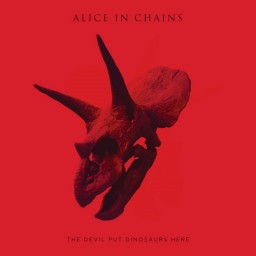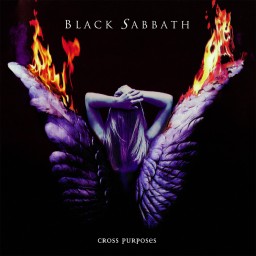Daniel's Reviews
After making a reasonable return to form in the late 2000’s with albums like “United Abominations” & “Endgame”, 2011’s “Th1rt3en” release saw Megadeth make a rapid descent back into the realms of the disposable. After heading further & further back towards their metal roots during the 2000’s “Th1rt3en” saw Dave Mustaine indulging his more commercial side once more. This wouldn’t be such a bad thing if he was able to produce material akin to the catchy metal anthems we heard on albums like “Youthanasia” however the quality just wasn’t there on this occasion & the highlights were few & far between. Subsequently my hopes for yet another return to form with “Super Collider” were pretty slim; especially after reading the early reviews which labeled it athe worst Megadeth album since 1999’s “Risk” disaster.
However the early tracks on “Super Collider” seemed to indicate that things may not be as bad as all that. The production job is excellent & it gives the songs every chance to dig their hooks right in. The musicianship is also of a very high quality. Dave Ellefson has now well & truly re-established himself in the band & he seems to gel extremely well with drummer Shawn Drover. They work as a unit to create the solid backbone Megadeth needs from their rhythm section. Chris Broderick’s lead playing is not quite as flashy as it has been on past albums but that’s not necessarily such a bad thing as he has been found to be lacking in the memorability department on occasions. In fact I quite like his work here. It’s a little more sparse but is genuinely effective when he lets loose. The rhythm guitars are nice & crunchy & there are some great heavy metal riffs on display here.
“Super Collider” may not be the band’s most metal release but it’s certainly not their least either. This is undoubtedly heavy metal. There aren’t too many tracks here that I’d call “hard rock”. Sure a lot of the material is written in a more song-oriented format than the riff-based formula they used during their classic thrash metal days but it’s still got a fair bit of potency. There’s still the odd thrash riff & some powerful double kick drumming every now & then. The one area that the sound falls down a little is in the vocals. Dave’s voice is not what it used to be & the gravelly Alice Cooper-ish style we heard on “Th1rt3en” is probably a little more evident here. I don’t think it’s such a problem but I can understand how some people might find it to be. In truth I'm not sure I would be mentioning this if I hadn't heard Dave in his prime. He's obviously not getting any younger though.
The quality of the song-writing is much better than we heard on “Th1rt3en”. This is a much more consistent record. The catchy title track, dark brooder “The Blackest Crow” & an energetic cover of Thin Lizzy’s classic “Cold Sweat” are amongst the highlights although my personal favourite would have to be “Off The Edge” which hasn’t left my brain since my first listen. There aren’t too many complete failures here although things start to drop off later on with “Forget To Remember” & the horrible “Don’t Turn Your Back…” being well below par. There are a few tracks that possess some really great riffs but don’t quite hit the spot overall. Luckily the production seems to carry these songs a bit & they don’t impact my enjoyment of the album so much.
Overall I think around half of the material on “Super Collider” has comfortably exceeded my expectations while the other half sounds a bit better than it actually deserves thanks to the high quality musicianship & production work. It’s certainly a heavily underrated release & it’s pushing “United Abominations” & “Endgame” in terms of quality & consistency. Perhaps this one might fall under the category of “guilty pleasure” for me but I can’t for the life of me see how people can be comparing this album to the likes of “Risk”, “The World Needs A Hero” or “Th1rt3en”. It’s got a lot more to offer than that & I suggest you give it a spin so as to make your own informed decision.
Genres: Heavy Metal
Format: Album
Year: 2013
The late 2000’s saw Megadeth return to a reasonable sort of form with both 2007’s “United Abominations” & 2009’s “Endgame” making a noticeable improvement on their previous string of failures & helping to rebuild their profile in the global metal scene. Pleasingly Dave Mustaine had opted to direct his song-writing approach further towards his metal roots with each album & the more commercial radio-friendly tracks were being gradually phased out in favour of some thrashier numbers that often hinted at the band’s golden age if not ever really looking like matching it. There weren’t quite enough hooks to give these two albums the replay value I would have liked but things were looking up & I was actually quite interested to see what “Th1rt3en” had to offer. The return of long-time bass player Dave Ellefson could only be a positive thing & perhaps this time Mr Mustaine would manage to put together some thrashy metal tunes that also had the hooks to give them the potential for repeat listens.
Right off the bat it’s clear that this is not the case. “Th1rt3en” opens with a few songs that (whilst not overly bad) are certainly pretty uneventful. It all sounds very much like everything Megadeth have released for the past twenty years. The production is very good as usual but nothing much seems to grab me. With the exception of a couple of tracks there is also an obvious return to a more commercial & radio-friendly song-writing style & all of Megadeth’s hard work to resurrect their credibility over the previous five years seems to have been disregarded. The middle of the record sees things dip further with horrible songs like “We The People”, “Guns, Drugs & Money” & “Wrecker” showing a scant disregard for quality control. Thankfully the end of the album makes somewhat of a recovery with the final two tracks “Deadly Nightshade” & “13” being the clear album highlights in my opinion.
The instrumental performances are all very good. Dave Ellefson gives the bottom end a really solid platform & he hooks in so nicely with drummer Shawn Drover. Megadeth are a better unit for Junior’s return. Predictably Chris Broderick’s lead solos are highly technical & very flashy without ever being terribly memorable & Dave Mustaine’s rhythm guitar work is as solid as ever. Dave’s voice isn’t what it used to be. In fact the gravelly approach he has taken here often reminds me of his old mate Alice Cooper. It’s not distracting or anything but I definitely prefer his razor-sharp 80’s style. The lyrics here aren’t exactly brilliant either. Where is the tongue-in-cheek wit of the band’s heyday?
“Th1rt3en” is a disappointing effort from a band that has only recently proven that they are capable of much better. I’m not sure why Dave Mustaine has elected to go with a more commercially focused direction again after the reception to “Endgame” was so positive. A bit of variety wouldn’t go astray either as Megadeth albums have sounded pretty similar for a very long time now. On the evidence of this album I suspect that the chances of Megadeth releasing another high quality metal album may be slim.
Genres: Heavy Metal Thrash Metal
Format: Album
Year: 2011
After a string of four subpar albums in succession I was happy to hear a noticeable improvement on Megadeth’s 2007 release “United Abominations”. Not only was it a bit more consistent than the previous records but it was also a little heavier. There were still a few flat songs here & there but the highlights were enough to pull me through & I was left with some optimism with regard to future releases. Yet more cause for optimism could be found in various reports that 2009’s follow-up album “Endgame” was the long sought-after return to form that fans had been waiting on. I often find that my opinions don't always match up with the common concensus so I reserved my judgement & sat down to my first listen with an open mind.
My first impression was that ”Endgame” is not drastically different from the last record. In fact Megadeth haven’t made any huge changes to their sound since they bombed out completely with 1999’s appropriately named “Risk” album. Instead Dave Mustaine has chosen to make more subtle changes with each album so as to slowly improve on the weaknesses of the last. If you listen to each successive release from 2001’s “The World Needs A Hero” onwards you can hear the band getting slightly less commercial, a little bit heavier & a touch more consistent each time without ever losing focus on hooks & song-writing. It hasn’t always worked but that seems to have been the goal. Subsequently we’ve ended up with a faster & thrashier Megadeth than we’ve heard since 1990’s “Rust In Peace” but not one that sounds like they’ve made enormous alterations or taken substantial risks. The illustrious “thrash metal” label is not out place when describing “Endgame”. There are certainly a lot of thrashing riffs on offer but Mr Mustaine hasn’t let go of his commercial aspirations altogether just yet. You’ll still hear some fairly radio-friendly choruses on occasion but with a little more subtlety than we’ve seen in recent times.
I was very impressed with new lead guitarist Glen Drover’s performance on “United Abominations” so I was a little annoyed to find that he had then left the band before the recording of “Endgame”. However I needn’t have worried too much because Dave then recruited former Jag Panzer guitarist Chris Broderick & he shows that he really has some amazing chops. I’m not sure I enjoy his solos as much as Drover’s (or other Megadeth guitarists of the past like Marty Friedman & Chris Poland for that matter) as he can sound a little over-clinical & mechanical but that’s not a big complaint as I still find plenty to enjoy in Chris’ display of virtuosity. Dave’s riffs have rarely been as aggressive in recent years & the production is very solid as expected. So really all of the ingredients are there for a classic Megadeth album. The only question is in the quality of the songs.
As far as overall consistency goes “Endgame” is probably as solid an album as Megadeth have recorded since “Countdown To Extinction”. There aren’t any real clangers amongst this lot. But having said that there probably aren’t any bona fide Megadeth classics included either. The title track is my personal favourite & it’s unquestionably some high quality metal. The other songs are generally entertaining but seem to fall a touch short of the top shelf without really having too much wrong with them. I quite enjoy instrumental opener "Dialectic Chaos", thrashier numbers like "This Day We Fight!", "1,320'" &"Bite The Hand", the catchy hooks of "Bodies" & the very power ballad-ish "The Hardest Part Of Letting Go... Sealed With A Kiss" but they're also unlikely to change my life. The last three songs in particular feel a bit flat to me. So does “44 Minutes” which sounds quite a bit like a subpar track from the band's mid-90's period.
Overall I’m not sure “Endgame” is quite the muscle-flexing return to form that Megadeth’s fan base were crying out for but it’s definitely another step in the right direction. If Dave could keep this sound together & do a bit more work on the hooks & song-writing then something more special may be just around the corner. There’s not much in it but I think I probably prefer the underrated “United Abominations” just slightly over this one. It had a couple of tracks that were weaker than anything on “Endgame” but it also had more highlights to draw me in. Regardless it’s nice to feel like Megadeth are worth listening to again.
Genres: Heavy Metal Thrash Metal
Format: Album
Year: 2009
By 2004, Megadeth’s reputation as a reliable supplier of top class metal music was shaky at best. 1999’s “Risk” & 2001’s “The World Needs A Hero” were both complete misfires & to make matters worse frontman Dave Mustaine had sustained damage to his left forearm which had left him unable to play guitar for a prolonged period. The news that he had eventually gotten past this roadblock & was able to continue on with his music career did not surprise me in the slightest though. Regardless of your personal feelings towards him as a person there can be little doubt that he’s a determined & highly driven individual. Whether that drive stems from healthy sources is debatable but I’ve gotta give him credit because most people would probably have taken the easy option & retired from the industry. Anyway... it’s not too surprising that the prospect of another ordinary Megadeth release didn’t exactly fill me with excitement & anticipation. But then “The System Has Failed” isn’t exactly a Megadeth record. In fact, Dave wrote it with the primary intention of releasing it as a solo album but record company politics eventually won out & the end result was a brand new Megadeth album featuring Dave & some session musicians. The major point of interest for me was that former lead guitarist Chris Poland was back in the fray. His performances on the first two Megadeth albums (while suffering from a serious heroin addiction) were quite special so this was an exciting prospect. This was also the first Megadeth release not to feature long-time friend & bass player Dave Ellefson. How much of an impact this would have on the end result I wasn’t too sure.
The first thing that becomes obvious when listening to “The System Has Failed” is that it has a more metal sound than the previous couple of records. In fact it’s probably the heaviest album the band had released since 1992’s “Countdown To Extinction”. The production is noticeably crunchier & the song-writing is focused more heavily towards heavy metal than the more poppy hard rock direction we heard on an album like “Risk”. There are certainly still some poppy songs here & there but nothing really strays too far from the realms of what we would describe as traditional heavy metal. Dave even takes the occasional foray into his thrash metal roots on tracks like opener “Blackmail The Universe”. This is certainly a positive thing for an old metalhead like myself. As is the fact that there's plenty of time allocated for guitar solos; an important element of the band that was given a backseat for a couple of albums there but had made a bit of a comeback on “The World Needs A Hero”.
Regardless of the positives I’ve mentioned “The System Has Failed” still suffers from the same sort of inconsistencies that plagued the previous three records. I quite enjoy nearly half of the album but the rest seems to be a bit below par. To be fair, the weaker tracks are nowhere near as bad as we heard on “Risk” or “The World Needs A Hero” & there are more high quality songs here but I don’t think it’s enough to lift Megadeth out of the doldrums. The other disappointing element for me is in the soloing. I’m not sure who is playing what solo here but some of them sound rushed & unimaginative while others don’t suit the backing track very well. I expected a lot more from Chris Poland’s involvement. It may be that I’m simply noticing all of Dave’s solos & he is admittedly still recovering from his injury but it’s worth noting anyway as it impacts on my overall enjoyment of the album.
The best material seems to be towards the end of the album with the catchy “Of Mice & Men” & closer “My Kingdom” (which reminds me a lot of "Hook In Mouth" from their 1988 album “So Far, So Good…So What?”) appealing to me the most. They’re both genuinely high quality heavy metal tunes. I also enjoy “Blackmail The Universe” & “Something That I’m Not” quite a bit as well as short interlude “I Know Jack”. Unfortunately I just don’t think the song-writing is good enough on the rest of the material. The punky “Back In The Day” is probably the worst offender while “Kick The Chair” & “Truth Be Told” are also pretty uninspiring. Someone really needs to tell Dave to put the tambourine away for good too. I’ve cringed every time he’s tried it on the last few albums & there’s another example here on "Truth Be Told". It’s not clever. It doesn’t make the track more radio friendly. It just makes it sound more cheesy.
“The System Has Failed” is definitely a step in the right direction. It’s a noticeable step up from the “The World Needs A Hero” & “Risk” abominations & I think it’s also slightly more appealing than “Cryptic Writings” but it’s not enough to restore my faith in Megadeth. It’s certainly possible that Dave’s injury contributed in not allowing him the full freedom of expression but I suspect that isn’t the case. Until he can produce some more consistent song-writing I will find little in the way of replay value in his albums.
Genres: Heavy Metal
Format: Album
Year: 2004
1999’s “Risk” was unanimously regarded as a complete failure for Megadeth. 1997’s “Cryptic Writings” had started the alarm bells ringing but “Risk” well & truly justified those fears. It did include a few decent tracks that seemed to indicate that the band still had the ability to write a catchy song or two but the obvious attempts to tap into a more commercial market were a huge turnoff & the quality control seemed to have been pushed to one side for the time being. So it’s fair to say that my hopes for a turnaround with 2001’s “The World Needs A Hero” were not exactly high. Honestly I was just hoping for a return of the more tried & true heavy metal sound they’d been so successful with in the early to mid 90’s & that’s pretty much what they’ve tried to achieve here. Unfortunately I think it’s fair to say that the results are very mixed.
It becomes clear pretty quickly that the Megadeth we are hearing on “The World Needs A Hero” is one that is regretting the approach they took with their last album & the return to a heavier sound was certainly not unwelcome. Don’t get me wrong. There are still plenty of more commercially focused moments on this album but it’s clear that Megadeth were committed to using a predominantly heavy metal toolkit on this occasion. The album also features a more extensive use of guitar solos than we’ve heard on the previous couple of releases. I’ve always felt that the solos were an important part of the Megadeth arsenal & I’d been missing them a bit of late. The examples on display here are not quite as impressive as those we’ve heard from guys like Chris Poland or Marty Friedman over the years but they’re undoubtedly a step in the right direction.
The album gets off to a horrible start with the opening three tracks all falling well below the mark. In fact if you look at the album as a whole the amount of overall quality song-writing is very similar to “Risk”. There’s really only a few decent tracks here. “Recipe For Hate…Warhorse” is my personal favourite. The second half of this track is probably the closest Megadeth have come to their classic sound in many years. I also find “1000 Times Goodbye” & “Burning Bridges” to be pretty catchy & enjoyable. There is very little to be said for the rest though. “Promises” is arguably the worst track the band had recorded to that time while “Silent Scorn”, “Moto Psycho” & “The World Needs A Hero” are not much better. “Return To Hangar” is nothing more than an attempt to rehash past glories & the nine minute closer “When” is one of the most blatant rip-offs I’ve ever heard. It seems that the band have consciously tried to copy Diamond Head’s “Am I Evil?” to such an extent that it is easily apparent to even the most casual of metal fans.
While “The World Needs A Hero” might have sounded good in theory it’s execution was very ordinary & it has ended up being just as unsuccessful as its predecessor. I probably favour this one just slightly over “Risk” but there’s not much in it. These two albums seriously affected the interest the global metal market showed in Megadeth over the next couple of releases but on the positive side of things they could only improve.
Genres: Heavy Metal
Format: Album
Year: 2001
Megadeth’s 1995 release “Youthanasia” was not initially something that appealed to me. I’d been a fan of the band since 1988 by that stage & it’s more simple & controlled blend of traditional heavy metal & pop melodies was a long way from the thrashy aggression of their earlier work. However with repeat listens I found it to be annoyingly consistent & particularly catchy. I ended up giving it more than a few spins but by the time “Cryptic Writings” was released in 1997 I’d lost interest in Megadeth & let it pass by without raising an eyebrow. Given that I’ve recently been enjoying some of my old Megadeth albums I thought I’d sift through their post-1995 material (if only for the sake of completism).
“Cryptic Writings” is not a major side step from the sound the band had been honing on both “Youthanasia” & “Countdown To Extinction”. There’s again a strong emphasis on song-writing & melody with traditional song structures & radio-friendly track lengths. The production is perhaps not as clinical but the overall goal seems to have been similar. What differentiates “Cryptic Writings” though is that it’s a bit more varied than “Youthanasia” was. The band have taken a few calculated risks & thrown in the odd curve ball which is in direct contract to the approach on “Youthanasia” which was heavily focused on a consistent sound. Marty Friedman’s guitar solos have been toned down a bit which I’m not too keen on. I’d much rather hear him play the more expansive & exotic style he’s known for.
There are a couple of tracks that are more aggressive than anything we’d heard from the band on the previous couple of albums. “The Disintegrators” is quite thrashy & reminds me of some of the material on "Killing Is My Business... & Business Is Good!" while “FFF” is pure snotty punk rock. Unfortunately neither of these tracks come close to the standard of the band’s classic material. In fact they’re probably the weakest tracks on the album in my opinion along with “Have Cool, Will Travel” & its obscure harmonica solos. But it’s not all doom & gloom. There are a few really decent songs included as well. The hit single“Trust” is probably the best of them & you’ll find yourself singing the chorus for a couple of days after you hear it. "Mastermind", “Sin” & “She-Wolf” are also very solid & would compete very well against the material from "Youthanasia".
The problem here is inconsistency. “Cryptic Writings” doesn’t gel as an album for mine. It lacks focus & the quality of the material is hit & miss which prevents the songs from working together as a cohesive unit. The highlights are cancelled out by some particularly weak tracks & the rest is simply not as good as we’d come to expect from Dave Mustaine & his men. Even though I greatly prefer the band’s thrash metal material I would certainly have appreciated another bunch of catchy songs in the vein of the previous couple of albums but unfortunately “Cryptic Writings” doesn’t really deliver.
Genres: Heavy Metal
Format: Album
Year: 1997
I originally got into Megadeth in my early teens back in 1988. "Peace Sells... But Who's Buying?" & "So Far, So Good... So What!" were my entry points & I quickly became a big fan. I ventured back to the debut album a short time later & although I liked what I heard I never gave it as much time as I did the next 3 or 4 albums. Listening back now it's immediately obvious that the band had enormous talent. The technical proficiency of the band was exceptional when compared with most thrash metal debuts of the time. David Ellefson's bass performance is excellent, Gar Samuelson's jazzy drumming is quite interesting & Chris Poland's guitar solos are both flashy & memorable. Dave Mustaine's riffing features a more distinct NWOBHM influence than on subsequent releases but there's also a raw thrash metal intensity that is quite exciting. Dave's vocals were a little more untamed than the ones we would later become used to as well & I quite like them.
Where "Killing Is My Business.. & Business Is Good!" falls down is certainly in the production department. The band blew half of their production budget on booze & drugs & the end result reflects that pretty obviously. The guitar sound is particularly thin & quite a bit softer than I would like. This really does minimize the impact that the album is capable of having & some of these songs really deserve better.
The quality of the song-writing is good but a little inconsistent. The band's signature tune "Rattlehead" is the clear highlight & is probably the only track that manages to transcend the production problems to be regarded as a truly great thrash metal song. "Skull Beneath The Skin" is pretty close to the mark as well while "Last Rites/Loved to Death", "Killing Is My Business... And Business Is Good!" & "Looking Down the Cross" are all solid & effective. The inconsistencies I mentioned come in the form of Nancy Sinatra cover version "These Boots", the rockier NWOBHM-influenced "Chosen Ones" & the fairly pointless rehash of "Mechanix". "Chosen Ones" is probably the weakest link in my opinion as it doesn't maintain the intensity of the rest of the album. To be honest "These Boots" is kinda fun but I would much rather have enjoyed some more serious Megadeth original material. "Mechanix" is an obvious attempt to out-Metallica Metallica & although the track is not horrible it fails to match "The Four Horsemen" in terms of weight & class.
"Killing Is My Business... And Business Is Good!" is an essential album for all Megadeth fans although it isn't the classic release that some would have you believe. It marks a solid start for the band & shows signs of greatness but is let down by poor production & inconsistencies in quality.
Genres: Speed Metal Thrash Metal
Format: Album
Year: 1985
After "Grand Declaration Of War" received a less than positive response I was interested to see where Mayhem would go next. I actually quite enjoyed the GDOW experiment & felt that it was unfairly criticized. The question was would they continue to expand on those ideas or revert to the tried & true. Although the answer to that question is not entirely straight forward "Chimera" leans further towards the older sound than the new.
This time we see Mayhem reverting to a similar sound to that of 1997's "Wolf's Lair Abyss" EP which contained a fairly brutal black metal attack with some more technical song & riff structures than they had attempted before. There were a couple of things that frustrated me about "Wolf's Lair Abyss" & both of those things have been improved on with "Chimera". Firstly the production is comfortably the best of their post-"De Mysteriis Dom Sathanas" releases. The weak drum sounds that plagued the last couple of releases have been improved on & the guitars have continued with the fuller sound found on GDOW. Secondly the song structures are a bit tighter than they were on WLA.
Another notable feature of "Chimera" is the riffing of Blasphemer which is very adventurous & you can definitely hear a strong death metal influence (Morbid Angel & Death in particular) as well as the more traditional black metal one. There's a greater sense of melody than we're used to hearing from a Mayhem record & it makes for a different atmosphere. I feel that this is one of the reasons behind many people's criticisms of this album as it's not quite as dark as your average Mayhem record but personally I really love Blasphemer's approach here. Not all of the more progressive sections work completely but they keep things interesting. Tempo-wise "Chimera" is a pretty brutal record too. Hellhammer really gives his kit a good belting but there's also enough variety & some nice progressive elements to keep things interesting.
Overall I think "Chimera" is a solid black metal record with lots of energy & some fresh ideas in the riff department. Some songs are stronger than others but there can be no doubt that you are listening to a class act throughout. It's not as dark & menacing as "De Mysteriis Dom Sathanas" but it's good to see that Mayhem aren't going to live in the past. In my opinion this is Mayhem's best release since 1994.
Genres: Black Metal
Format: Album
Year: 2004
The first couple of Kyuss albums didn’t exactly set my house on fire. There were some promising moments but the song-writing was generally inconsistent & the production & musicianship weren’t amazing. The Sons Of Kyuss album was nothing more than a primitive learning experience for a band that was still developing the skills of their trade. The debut Kyuss album “Wretch” was a step up from there but it included more than half of the tracks from the debut & the production still wasn’t ideal. The things that stood out to me from those records were a singer with true charisma & a solid rhythm section. Songs like “Son Of A Bitch” proved that Kyuss had what it took to create great rock music but could they do it consistently?
“Blues For The Red Sun” instantly proved that they could. It showed improvement in all areas. The production was much more suitable than we’d heard from them before. It was warm & fuzzy but also very heavy with a real 70’s vibe to it. Brant Bjork’s drumming was a lot more interesting than it ever had been in the past while Nick Oliveri’s bass sound was more powerful. The real improvement from an instrumental point of view though was in Josh Homme’s performance on guitar. He seemed to struggle with his technique a little on past releases but here he is far more in control. There seems to be a continual stream of quality riffs being pumped out of his axe & even his solos are a lot more accomplished than anything he’d offered up previously. There's been a noticeable increase in the amount of psychedelia on offer here & the band seems to be having great fun jamming away. There’s even a few psyched out instrumentals to break things up. I don’t think the band were capable of pulling that sort of thing off previously so it’s a strong indication of how far they’d come.
As with “Wretch”, John Garcia’s vocal performance is again the highlight of the album in my opinion. I simply love the guy’s voice. That gnarly desert accent does it for me every time. In fact, if I go through the tracklisting & pick out my favourite songs they will inevitably feature a major contribution from John. Don’t get me wrong. I don‘t mind instrumental pieces like “Molten Universe”, “Apothecaries Weight” & “Caterpillar March” but John really takes this music to another level altogether. I think the album would have been even better if Kyuss tried harder to utilize John’s assets. There could be way more of his signature vocal style included here. Why smother his voice with effects on “Mondo Generator”? I’m not saying I don’t enjoy the song but I feel quite confident that I would have enjoyed it more without the effects.
Whereas “Wretch” suffered from inconsistent song-writing “Blues For The Red Sun” is at the other end of the spectrum altogether. In fact if you disregard the three second waste of space closing track “Yeah” it doesn’t include a weak song. “Green Machine”, “Allen’s Wrench” & my personal favourite “50 Million Year Trip (Downside Up)” are amongst the most potent material Kyuss ever recorded while tracks like “Thumb” & “Freedom Run” are also of a very high quality. All of the issues I had with "Wretch" have been addressed here & Kyuss have proceeded to create some far more substantial music that is both endearing & engaging but also very fun. This is a great example of the stoner rock genre done well.
Genres: Non-Metal
Format: Album
Year: 1992
Judas Priest were on a real high following the huge success of 1980’s “British Steel” album which had finally enabled them to crack that elusive US market. It had seen the band moving into the 80’s with a simpler, glossier & more accessible sound which was always going to be more appealing to a US audience that had traditionally had far less patience than its European counterparts. The increased revenue that this brought in allowed the band to upgrade their recording budget for their seventh album which was recorded in Ibiza Studios in Spain between October & November 1980.
The aim was to produce a louder, stronger & more live sounding record & I think Judas Priest achieved that with “Point Of Entry” being released in February 1981. It saw the band moving closer again towards a more commercially accessible sound with far more traditional hard rock riffs included than chuggy bottom string metal ones. This didn’t impress the metal community much & I think it would be fair to say that “Point Of Entry” was regarded as Judas Priest’s least popular studio release to that time even though it may have sold a fair few copies. That’s really not all that surprising given that Priest had elected to drop their intensity when the rest of the metal scene was hell bent on increasing theirs. I have to admit that I don’t mind Priest’s more accessible sound though even though I agree that it was not as strong as we’d heard from their previous material.
“Point Of Entry” is a real mixed bag as far as quality goes with some really great material mixed in with some pretty weak songs. As expected, the more metal numbers offer the most appeal but I think it would be out of line to simply disregard a record because its metal credentials aren’t as strong. The fact that “Point Of Entry” is more of a hard rock record than a metal one is in no way responsible for me regarding it as weaker than the band’s previous material. The quality of the song-writing is the deciding factor in that decision. AC/DC was again a massive influence on the sound of this record & a large proportion of the riffage can be tied back to the Young family in some way. The B side includes three real failures in a row which can take some of the gloss off the album highlights if you’re not careful. “All The Way” in particular is both cheesy & dumb with US commercial radio play firmly in its sights. Both “British Steel” & “Killing Machine” had their more commercial numbers however they still possessed enough metal elements to carry them whereas it’s not quite as cut & dry with “Point Of Entry”. Of the ten tracks I would suggest that I really only enjoy half of them but the highlights are just strong enough to ensure that I get enough enjoyment out of it to make the whole experience worth while even though I rarely find myself feeling the urge to return to it when there are so many stronger Priest records out there to quench my metal thirst.
Overall, I’d recommend that fans of hard rockin’ heavy metal should give “Point Of Entry” a listen or two with an open mind. I’d be surprised if you don’t at least find a few songs to spin on your iPod even if you can’t deal with the album as a whole. “Desert Plains” in particular is amongst Priest’s classic songs in my opinion while “Solar Angels” & “On The Run” are also really strong.
Genres: Heavy Metal
Format: Album
Year: 1981
I strongly believe that Judas Priest took a noticeable step up with their 1978 release “Killing Machine”. They had finally left their 70’s hard rock/proto-metal roots behind & had graduated to become a full-fledged heavy metal band in the classic sense of the term. Subsequently I found “Killing Machine” to be the first Priest album to really impress me. I’d enjoyed all of their earlier material but I couldn’t say that any of it really packed the consistent punch to draw me in for regular revisits. “Killing Machine” also marked the start of a new era for the band. The songs tended to be produced in a more radio-friendly package now. The track lengths were shorter & some showed distinct signs of a more commercial edge but at the same time everything sounded more metal than before.
On “British Steel” Judas Priest took the new concepts they’d showcased on “Killing Machine” & expanded them further which resulted in a more evolved sound. The production is excellent which gives the final product a more polished feel. It’s a very similar record to “Killing Machine” in that it combines up-front metal anthems with more radio-friendly & poppy material but the poppier stuff is taken a little further here & is subsequently less appealing to my tastes. The ballads that have been a regular fixture on previous material have been omitted on this occasion which is fine by me as that’s never been what Priest have been about for mine. The guitar solos are a definite highlight. They’re as shreddy as anything we’d heard from Priest up to that time & they add a good deal of excitement to proceedings. Rob Halford’s vocal performance is exceptional as usual. He adds that touch of class that can take an average idea & make it seem exceptional.
There are a few extremes in the tracklisting to be fair. Things start off in a familiar fashion as opening track “Rapid Fire” is your usual high quality up-tempo Judas Priest opener. This is followed by an absolute stormer in album highlight “Metal Gods”. There has rarely been a more suitably titled metal track. Then we get our first glimpse at a more commercial sound with the classic “Breaking The Law”. It’s a very basic song that relies heavily on a simple vocal hook. It’s not a bad song but it’s certainly overrated. The intensity picks up with “Grinder” which is another timeless metal anthem before the first half peters out with the extraordinarily poppy “United”. I simply can’t tolerate this song. It attempts to emulate Queen’s “We Will Rock You” in a similar fashion to “Take On The World” from “Killing Machine” but this time the cheese is laid on thicker & it ends up being a very disappointing experience.
The B side opens with the very cool “You Don’t Have To Be Old To Be Wise” before again descending into commercial excess with “Living After Midnight” which has a chorus that would be much more at home on a Poison record. Luckily the high quality returns with “The Rage” which is an utter belter. I consider it to be amongst Priest’s best ever tracks. The reggae influenced intro reminds me very much of The Police before it busts into some truly epic metal riffs & a brilliant Halford vocal performance. Album closer “Steeler” is not a bad track but it’s probably one of the less memorable moments on the record.
As you can see "British Steel" includes some real ups & downs & everything in between. It's an album of extremes. We have some truly epic metal anthems mixed in with some pretty unintelligent pop songs. Thankfully the highlights well outweigh the negatives. I thought “Killing Machine” was the best of thing Priest released in the 1970's & “British Steel” definitely had the potential to top it but unfortunately it fell a little short. A lot of that can be put down to the band's commercial aspirations & in fairness they got what they were looking for. Regardless this is still a very solid Priest record with some amazing highlights that should be standards for any heavy metal fan worthy of wearing a bullet belt.
Genres: Heavy Metal
Format: Album
Year: 1980
Judas Priest were on quite a streak in the mid-to-late 1970’s. Their first four albums had seen the band going from strength to strength & as their confidence grew so too did their ambition. So much so that barely eight months after the release of their last album Judas Priest fans were gifted with yet another record from their heroes. I quite enjoyed “Stained Class” from earlier that year. It was yet another solid effort but I have to admit that although I really enjoy the early Priest albums I can’t say that I genuinely love any of them. I think I’m perhaps a bit young to really be able to relate to them as well as someone who was a teenager in the late 70’s would. Still, each release saw Priest getting that little bit more metal & my interest was growing accordingly.
I can vividly remember the first time I heard “Killing Machine”. It was around 1987/88 & I was about twelve years old. I was visiting a mate’s house after school & his older brother was a big heavy metal fan. He also played lead guitar in a band so we both thought he was pretty cool even though he was generally a bit of a prick to both of us. On this occasion he was enjoying our attention so he was being friendly & playing us some Iron Maiden albums in the lounge room. It must have been pretty obvious that I was becoming heavily involved with the music so at some point he went back to his bedroom & brought back a cassette copy of “Hell Bent For Leather” (i.e. the US release of “Killing Machine). I'd never heard of Judas Priest before but the album made quite an impression on me. I borrowed the cassette so that I could dub it at home & ended up playing that tape to death over the next couple of years.
Priest didn’t really change things dramatically from album to album during the 70’s. They generally made small adjustments to their already well-defined formula in order to fine-tune their sound. Thankfully for me the changes they made for “Killing Machine” took them in a direction that really suited me. Firstly, the guitar sound & riffing style is more metal than ever before. In fact I’d go so far as to say that this was the moment when Judas Priest went from being a 70’s proto-metal band into a fully-fledged heavy metal act in the 80’s sense of the term. This adjustment went along very well with the band’s new image of leather & studs too. The other noticeable adjustments are the shorter & more marketable track lengths & the inclusion of a couple of tracks with a consciously commercial edge to the song-writing & hooks. Some people may feel that this was selling out however I think that those people are missing the point to an extent.
The album begins with a major bang. Opening track “Delivering The Goods” is an absolute monster! In fact of all of Priest’s 70’s material this song made the biggest impression on me. The riff during the chorus is as metal as it gets & I literally get goose-bumps every time I hear it. “Hell Bent For Leather” & “Burnin’ Up” also provide some major highlights & are both up there with the best tracks Judas Priest has ever recorded. “Killing Machine” (a bad-ass bluesy chugger), “Running Wild” (a heavy metal anthem that sounds like it provided Iron Maiden with the blueprint for many of their early songs) & “Evil Fantasies” (a sexy rocker that owes more than bit to Led Zeppelin) are also of a very high quality. However as with all of Priest’s albums up to this point we also get a couple of less impressive tracks. “Rock Forever” is a pretty basic hard rock tune that's unfortunately crushed under the weight of “Delivering The Goods” while acoustic ballad “Before The Dawn” is a fair bit too cheesy for my taste & this brings me to my next point. There are definitely a couple of tracks on “Killing Machine” that tread pretty close to that line. Both “Evening Star” & “Take On The World” seem to be clear attempts at a more commercial sound. They're both very simple with big choruses & sound like they would fit in very well on commercial radio. In fact “Take On The World” is a very obvious attempt to emulate the appeal of Queen’s “We Will Rock You”. Luckily I think both tracks have the hooks to keep me interested. The verse of “Evening Star” is quite brilliant & carries the track through a subpar chorus. This commercial edge would continue to pop up on future albums with varying success. I’m open to a more commercial sound as long as the songs hold up but if we look at “Killing Machine” it’s pretty clear that the best material comes from the more serious metal tunes. Luckily there are so many great ones.
I don't think it's unfair to think of "Killing Machine" as the start of a new era for Priest as the band started to take new directions with their sound. In fact I think they were ready for a change & “Killing Machine” might just be the first Judas Priest album that I really loved. Don’t get me wrong. I like all of their 70’s material but this one just hits a bit closer to home for me & has more highlights. It’s also that little bit more metal which pushes it further into my comfort zone. It really is unbelievable that the band was able to pull all of this together in such a short space of time.
Genres: Heavy Metal
Format: Album
Year: 1978
I had mixed feelings about Judas Priest’s third record “Sin After Sin”. There were some great moments but a couple of disappointing songs in the middle of the album meant that I probably didn’t enjoy it quite as much as the previous two Priest records. I was happy to hear them taking further baby steps towards the sound we now know as modern heavy metal though. The albums closing track “Dissident Aggressor” really showed us what could be achieved with dark & heavy riffs so 1978’s follow-up album “Stained Class” had a great opportunity to capitalise on that groundwork.
Priest’s sound hasn’t changed dramatically on “Stained Class”. In fact it was very similar to the one they showcased on “Sin After Sin”. On the positive there were no overly cheesy ballads like “Last Rose Of Summer” this time. The dual guitar attack was probably more potent than ever & Rob Halford’s vocals soared ever higher as he continued to gain in confidence. The guitar sound is still more firmly grounded in 70’s hard rock than heavy metal. It was probably their heaviest record to that time but a lot of that has to do with the style of the song-writing than the actual sound. They still hadn’t quite reached full blown metal status at that stage in my opinion.
Opener “Exciter” is a fast & energetic rocker that yet again shows off the band’s Deep Purple influence. The opening drum intro definitely hints at the classic “Painkiller” intro that was still twelve years away. “Exciter” is very typical of the type of opening tracks Judas Priest would go with in later years. It’s fast, simple & anthemic. Things continue well for the next few tracks with the cover version of late 60’s blues rock act Spooky Tooth’s “Better By You, Better Than Me” being particularly impressive. Priest have once again chosen to cover a tune that was by no means an obvious choice & have truly made it their own. In fact I think it might just be my favourite track on the album. Other highlights include the epic power ballad “Beyond The Realms Of Death” & the bad-ass riffage of closer “Heroes End”. The only track that I’m not overly keen on is “Invader” which once again sits right in the middle of the album. It just seems to be a bit light-weight & flat to my ears which is a shame because it’s really the only blemish on an otherwise fairly consistent tracklisting.
“Stained Class” is yet another solid release for Judas Priest. I probably rate it just slightly behind “Sad Wings Of Destiny” in terms of overall quality but once again I find myself struggling to say that it’s anything life-changing. Perhaps early Priest is just a little simple & tame sounding for someone who was raised on extreme metal like myself. It’s undoubtedly a fun listen but do I find myself craving the intensity of later albums like “Painkiller”. I don’t think the highlight songs are quite as strong as earlier classics like “Victim Of Changes” or “Dissident Aggressor” either & I think this is probably what stops me from rating it a little higher. On the positive side I have to admit that it’s as consistent a record as anything Judas Priest had released to that time & I subsequently find myself enjoying it slightly more than albums like “Rocka Rolla” & “Sin After Sin”.
Genres: Heavy Metal
Format: Album
Year: 1978
I quite enjoyed the first two Judas Priest albums. As an early teenager I was introduced to Priest’s 70’s material through 1976’s “Sad Wings Of Destiny” & I subsequently ventured further back to their 1974 debut “Rocka Rolla”. The debut may not have been terribly ground-breaking but it was a very solid piece of 70’s hard rock performed by some more than capable musicians & I found its honesty & warmth quite endearing. “Sad Wings Of Destiny” had lifted the bar higher as the band moved further into heavy metal territory & better utilized the weapons in their arsenal. I can’t say that I truly loved either record but they were undeniably high quality releases. I’m just not sure that “Sad Wings Of Destiny” is deserving of all of the praise that has been heaped upon it over the years.
1977’s “Sin After Sin” album followed a similar musical direction to “Sad Wings Of Destiny” really but you can see the evidence of the band pushing ever further from their hard rock roots. The twin guitar attack is becoming more & more prominent & Rob Halford’s vocal style more defined. The guitar sound is still built firmly on 70’s hard rock so younger metalheads may find things sounding a little tame for their liking but the riffing style is undeniably more shredding than bands like Deep Purple & Led Zeppelin. The production again suits Priest’s sound very well. All of the instruments sit nicely in the mix & there’s plenty of separation. Rob Halford is a true metal superstar by this stage & is the driving force of the band but the rest of the guys have formed a really solid unit. No one overplays their hand. Everyone seems to be focused on what is best for the songs rather than any sort of personal fame.
“Sin After Sin” has always seemed to me to be a bit of a sandwich in terms of song-writing quality. The album starts off very well. Opening track “Sinner” presents the blueprint for dozens of singalong metal anthems in future years with its simple single-word title & catchy hooks. Things take a further step up with a very interesting cover version of a gentle Joan Baez folk song called “Diamonds & Rust”. This version sounds nothing like the original. Priest’s interpretation is far more substantial & memorable in my opinion. Rob has done a fantastic job with the chorus & it’s difficult to remove from your head once it’s found its way in. “Starbreaker” is another of the simple anthemic singalong metal tunes Priest would become known for. Then we move onto a very commercial sounding ballad in “Last Rose Of Summer”. This is where things start to fall apart in my opinion. I find this song to be overly cheesy & it doesn’t really fit in with the rest of the album. It’s immediately followed by “Let Us Prey” which I find to be lacking a bit of intelligence. It’s an uptempo Deep Purple-style fist-pumper that features quite a bit of melodic lead guitar but I just don’t think it sounds sophisticated enough for my liking. Thankfully things pick up from there though with a much classier & expansive effort in “Call For The Priest/Raw Deal”. “Here Come The Tears” is a power ballad in the true sense of the term. It hints at some of the commercialism of “Last Rose Of Summer” before taking a much more powerful & captivating route. Well then… now that we’ve gotten through all of that material we can talk about the real star of the album. Closer “Dissident Aggressor” is a massive step up. Not just for Judas Priest but for heavy metal as a whole. It’s substantially heavier than anything we’ve heard from Priest before & the riffing style is simply savage. Rob puts in an epic display. This song is easily amongst Priest’s best material & it’s significance to heavy metal in the 1970’s cannot be underestimated.
Overall I find “Sin After Sin” to be another enjoyable Judas Priest album that shows off all of the elements that make for a truly great heavy metal record but it doesn’t quite get there in my opinion. The slump in the middle of the album really lets it down & I find that I actually prefer the previous two Priest records to this one. Tracks of the quality of “Dissident Aggressor” & “Diamonds & Rust” make it blatantly obvious that this is a great heavy metal outfit but I don’t think they had hit the level of consistency I had hoped for just yet.
Genres: Heavy Metal
Format: Album
Year: 1977
I quite enjoyed Judas Priest’s debut album “Rocka Rolla”. The production & performances really captured the electricity of the band’s live performance & the song-writing possessed an honesty & innocence that I found quite endearing. Priest may not have acquired some of their trademark elements at that stage but they could certainly put together a decent hard rock record. It was already quite apparent that this was a class act & I still feel that “Rocka Rolla” is a largely underrated release. Its qualities are often overlooked due to the magnitude of the classic albums that followed it. Priest’s second release “Sad Wings Of Destiny” has always been seen as the point where the great band really hit their straps for the first time though so my early teenage self had some fairly high expectations when going into my initial listen. I was already a fan of later albums like "Killing Machine" & "Turbo" but this was the first of their early 70’s albums that I’d had the pleasure of experiencing.
The production is again very good. I don’t think this one has quite the live feel that “Rocka Rolla” did but you can hear that a bit more work has been done with it. Unlike the debut “Sad Wings Of Destiny” features a lot more riffs that I associate with heavy metal rather than 70’s hard rock bands like Deep Purple & Led Zeppelin. Black Sabbath is obviously still a big influence & the album is a bit heavier than the more laidback feel of “Rocka Rolla”. Vocalist Rob Halford is really coming into his own here with the inclusion of a lot more of his trademark high-pitched screams. There really aren’t too many that can touch Halford in this area even at that early stage. The dual guitar attack is also better utilized than it was previously & the musicianship & performances are strong throughout.
“Sad Wings Of Destiny” gets off to huge start with opening track “Victim Of Changes” marking a new high point for the band. It’s my favourite track on the album & one of their best overall in my opinion. I often notice that a couple of the main riffs in Metallica’s “Seek & Destroy” seem to be variations on some of the great metal riffs in “Victim Of Changes”. It’s not surprising as its simple chuggy riffs have a classic metal feel to them that really seems to get your average metal fan going. In fact the more metal oriented tracks seem to be the ones that appeal to me the most out of the remainder of the album too. “The Ripper”, “Deceiver” & “Genocide” are all high quality early metal tracks that possess that anthemic quality that has became such a big part of the classic Judas Priest sound over the years. There are a couple of ballads included too but they don’t make the same sort of impact in my opinion. “Dreamer Deceiver” gets off to a sluggish start before it’s saved by some excellent guitar solos & some great Halford vocals in the closing stages while “Epitaph” stands out like a sore thumb & is the only real failure. It has none of the classic qualities of Priest’s more epic metal material & is clearly the weakest track on the album.
I've always found “Sad Wings Of Destiny” to be a very enjoyable listen but I’m not sure that I find it to be the classic release that the rest of the world seems to. Perhaps that’s because I struggle to connect with it to the same extent as older fans might due to the fact that I was just one year old when it was released but I don’t think that’s it. I don’t seem to have any problem connecting with the first six Black Sabbath albums by comparison. I just think that “Sad Wings Of Destiny” sounds a little more of its time & has less of the timeless qualities of those early Sabbath records. It’s also not quite as heavy but it’s still a very good release in its own right. I think it’s certainly a better album than “Rocka Rolla” but not by anywhere near as much as it's commonly believed to be. Perhaps I’m just a child of the 80’s.
Genres: Heavy Metal
Format: Album
Year: 1976
I had some reasonably high expectations for 2003’s “Dance Of Death album. I’d been impressed with 2000’s “Brave New World” & thought that Bruce Dickinson & Adrian Smith’s return could have been just what the band needed to turn things around long term. Unfortunately “Dance of Death” didn’t live up to my expectations. It certainly wasn’t helped by a poor production job but the quality of the song-writing was never going to produce an album with much replay value. The vocal performance was patchy at times too & honestly I expected more from a Bruce Dickinson-led Iron Maiden. This dampened my enthusiasm for 2006’s “A Matter of Life & Death” substantially & when I finally got around to giving it a listen I was fully preparing myself for disappointment.
I was really hoping for a bumper production job on this album as Iron Maiden’s track record since their classic 80’s period has not been good in that respect. It immediately becomes apparent that I’m not going to see a great improvement in that area though. It’s certainly not as disastrous as the production jobs on albums like “Virtual XI” or “Dance of Death” but it’s still fairly thin & doesn’t give the guitars enough oomph. Thankfully it’s not enough to detract from the song-writing & musicianship on display & once I got used to the sound it wasn’t a big issue for me. The other thing that’s noticeable about “A Matter of Life & Death” is the lengthy track times & the more progressive song structures. It makes the songs a bit less obvious & they required more attention before they began to open up. I see this as a positive thing & it added another layer to the album for me. I’ve always enjoyed Maiden’s more progressive outings & I think they did a great job with the more expansive instrumental sections here.
While opening track “Different World” clearly fits the mould that Maiden have always chosen for their openers it’s simply not an inspiring call-to-arms. It doesn’t set the tone for the rest of the album nicely & is clearly the weakest track in my opinion. I felt very similarly about “Wildest Dreams” on the last album & I think the guys are trying too hard to fit the expectations of their fans. If there isn’t an “Aces High” or a “Tailgunner” amongst your material then I think it’s a bad decision to go with the closest thing you’ve got when it’s not quite up to scratch. Thankfully things pick up from there & there isn’t another disappointment to be found amongst the rest of the material. The second half of the album is particularly strong. Bruce puts in a stellar display on some of this material & he’s really found that form that was lacking during parts of “Dance of Death”. His performance on “Out Of The Shadows" makes it the highlight of the album for mine. It’s got one of those repetitive choruses that is so memorable & addictive that it will stay with you for at least the next 24 hours. “Brighter Than A Thousand Suns”, “The Reincarnation Of Benjamin Breej”, “For The Greater Good Of God” & “Lord Of Light” are also high quality heavy metal songs that show no shortage of ambition. This is impressive stuff. The sort of material that can’t be achieved by just anyone. We’re not talking wall-to-wall classics here but (with the exception of “Different World”) there is a solid consistency across the tracklisting.
I was pleasantly surprised by “A Matter Of Life & Death”. It’s not a classic release for the band but it’s a decent step up from the disappointing “Dance Of Death” & contrary to popular opinion I think it’s as good a record as the popular “Brave New World”. In fact Iron Maiden probably haven’t recorded a better album since their 80’s heyday. I would have loved to hear this release with a bumper production job. I think it could have taken it to another level.
Genres: Heavy Metal
Format: Album
Year: 2006
Bruce Dickinson & Adrian Smith’s return to the fold spurred Iron Maiden on to a comeback album of surprisingly high quality in 2000’s “Brave New World”. It certainly wasn’t a match for Maiden’s classic 80’s material (as some people would have you believe) but it was well above what could reasonably be expected after the Blaze-era had laid the band’s reputation to waste. It was a very consistent record that possessed all of elements of a great Maiden album but it didn’t quite have the highlights to put it up with the greats of their back catalogue. Regardless, I felt that it offered more than enough quality to indicate that Iron Maiden could still be a force to be reckoned with. Subsequently my hopes for the 2003’s followup album “Dance Of Death” were reasonably high. At the very least I was expecting to hear some epic anthems & some memorable singalong choruses.
When I first saw the album cover for “Dance Of Death” I was overcome by confusion. It looks extremely cheap to me & I was mystified as to how anyone could believe it was worthy of sitting alongside the great covers of Maiden’s past. But there it was & it wasn’t going to go away so I decided not to let it impact my listening experience. The other thing that was immediately obvious to me was the poor production. Maiden didn’t exactly have a great record with their recent production jobs but this one was particularly poor. The guitar sound was very muddy. It’s not enough to completely ruin my listening experience but it certainly doesn’t help. Stylistically things don’t seem far removed from your average Maiden album but I’m not sure the fans are after any sort of reinvention at this stage in their career anyway.
While there aren’t any complete shockers on “Dance Of Death” the song-writing is still pretty patchy. Songs like “Wildest Dreams” & “Montsegur” are a long way from the standard I expect from Iron Maiden & others just come across as a bit flat. There are a few songs that show quite a bit of promise only to be let down by a poor chorus (see “Journeyman”) or some cheesy folk sections (see “Dance Of Death”). Bruce Dickinson’s vocal performance is also a bit up & down. You can definitely hear the strain when he tries to hit high notes on a few tracks but then you’ll hear a chorus like the one on album highlight “Gates Of Tomorrow” & it’s clear that he still has the ability to take things where not many others can. This is a truly great Iron Maiden track; the only one on the album in my opinion. “Rainmaker” & “Age Of Innocence” are very enjoyable tracks too but they don’t quite make it to the levels of the great Maiden tracks of old.
“Dance Of Death” is not a horrible album. It doesn’t scream of its inadequacies. But at the same time its faults can’t be easily ignored. The dodgy production doesn’t help things much but even with a great one I doubt I’d find much replay value in it. It doesn’t have the consistency or the quality of “Brave New World” & I’d hoped for much better.
Genres: Heavy Metal
Format: Album
Year: 2003
The Blaze era was a disaster for Iron Maiden as far as I’m concerned. I really struggled with those albums & I highly doubt that I’ll ever revisit them. It wasn’t just Blaze’s vocals though. Everything about those records was diabolical & I don’t even think the presence of the great Bruce Dickinson could have saved them from critical & commercial failure. Therefore even the prospect of a Bruce Dickinson & Adrian Smith reconciliation album didn’t exactly set my hopes soaring. I would certainly have settled for another pleasant (if inconsistent) outing reminiscent of “No Prayer For The Dying” or “Fear Of The Dark” but I feared that may have been asking too much.
Luckily it wasn’t. It seems that Iron Maiden were able to exorcise most of the demons that had plagued their previous couple of albums & managed to tap into the sort of atmospheres we’d come to love from them over the years. “Brave New World” really sounds like an Iron Maiden record & that would have been a relief for so many people. I have to admit that on first listen I felt there was a noticeable amount of cheese present in some of the songs but after a few spins the hooks kicked in & I found myself struggling not to like tracks like “Blood Brothers” & “The Nomad”. I don’t love everything about a fair few of these tracks but almost all of them have epic singalong choruses that help to overcome my doubts & ensure that I enjoy my listening experience. There are quite a few extended atmospheric sections but the song-writing is substantially better than anything we’ve heard from Maiden since “Fear Of The Dark” & the production is also more solid.
There are a fair few high quality heavy metal anthems here. Tracks like “Brave New World”, “The Mercenary”, “The Nomad” & “Dream Of Mirrors” (my favourite) are highly engaging & quite memorable. I’m not sure any of them are true classics though. They all fall a touch short in some area for mine. The rest of the album is all pretty solid. In fact I think this is their most consistent release since the 80’s. “The Fallen Angel” is really the only subpar effort. Bruce puts in an energetic performance & it feels like coming home after a long (& most unfortunate) holiday. The rest of the band seems reinvigorated too. There’s a positivity there that was missing during the Blaze era.
I like “Brave New World” quite a bit. It’s a very good comeback & a genuinely solid & consistent effort. I’m not going to conspire to the idea that it’s a classic Maiden album though. I agree that it’s their best since “Seventh Son Of A Seventh Son” but I’m not sure it stands side by side with their 80’s material. It’s just missing the two or three truly magical tracks that their great records all possessed. I’m really proud of the boys for putting together such a solid & enjoyable album though. “The Fallen Angel” is the only thing holding me back from awarding it a 4/5 rating.
Genres: Heavy Metal
Format: Album
Year: 2000
Not bad but far too generic. The drumming & guitar solos are clearly attempts to copy classic Morbid Angel and they come up well short of the mark in that respect. The song structures also sound quite pieced together & forced to my ears. The guitar riffs are chunky as always but I'm genuinely surprised to see this release at the top of the RYM metal charts for the year. I would class Majesty & Decay as solid but forgettable generic death metal.
Genres: Death Metal
Format: Album
Year: 2010
I first encountered Gojira via 2008's "The Way Of All Flesh" (3/5) but it wasn't until 2012's "L'enfant sauvage" (4.5/5) that they really grabbed my attention. "L'enfant sauvage" showed a more progressive & highly professional outfit with plenty of intensity & a load of fresh ideas. I later checked them out live & saw a band that was totally in control of their instruments & sound so it was only a matter of time 'til I got 'round to checking out their most popular album.
"From Mars To Sirius" is a solid & highly focused album that sits somewhere between the sludgy death metal of mid-90's Morbid Angel & the melody & progression of early Devin Townsend. I find there's also a less distinct groove metal influence to some of the riffs. It's a heavy sound alright. One that's heavy enough to interest the death metal crowd but also has a strong sense of melody & an accessibility that you don't generally find in extreme metal. From memory it's a little less progressive than the bands later material but there's still plenty of variety.
The production is of a very high standard with an extraordinarily powerful bass guitar sound that the rest of the metal scene should really take note of as it's very rare that I encounter anything of that quality. In fact I'd say the bass guitar is the highlight of the album for me. The vocals are not your average unintelligible grunting either. They're closer to Devin's heavier moments & should appeal to a fairly wide audience.
I spent a fair amount of time deliberating over my score here. "From Mars To Sirius" is certainly a quality release & even though I don't think the more accessible moments appeal to me as much as the more brutal ones (or Gojira's more progressive ones from "L'enfant sauvage" for that matter) I can't help but be sucked in by the professionalism of the performances & production. It's 66 minute duration is certainly a little ambitious & the quality does fade just a little during the last few tracks but any fan of well-produced progressive death metal will find plenty to enjoy about "From Mars To Sirius" & it comes highly recommended.
Genres: Progressive Metal
Format: Album
Year: 2005
A very solid examply of mid-1990s Godflesh, "Messiah" is one of the band's safest releases in some time when you consider its sound comprises a nice mixture of all of the differing aspects that make up their back-catalog without really presenting anything terribly new. Some tracks are certainly stronger than others (with "Wilderness Of Mirrors" being a clear highlight for me with it's strong leanings towards the "Pure" album) but there are no real weak points. I really enjoyed stepping back in time to hear the sound I loved so much on the earlier Godflesh albums & feel that "Messiah" stands quite well on it's own merit. I would suggest it is essential listening for any fans of the band.
Genres: Industrial Metal
Format: EP
Year: 2000
I'm not too sure why I didn't pursue this release for so many years as I'm a long-time Godflesh fan as well as a big fan of dub in general however I've finally gotten around to checking this out. Godflesh's previous remix efforts have had mixed results so I wasn't sure what to expect here. What I got was fairly inevitable in the end. Mixed results. "Love & Hate In Dub" doesn't have the depth or intensity of proper Godflesh material. Opener "Circle Of Shit (To The Point Dub)" gets off to a solid start (if you excuse the ridiculously out of time percussion in one of the vocal samples) & "Gift From Heaven (Breakbeat)" is also impressive but apart from that I spent the rest of my listening experience waiting for some excitement. There's nothing obviously wrong but there's also not much to get excited about. Closing track "Gift From Heaven (Heavenly)" is the only track that really hits the spot. It is a brilliantly dark brooding piece of dark ambient nastiness that shows just what Justin Broadrick is capable of. The lack of guitars in most of these tracks here leaves them feeling a bit lifeless & the dub element is not really deep enough in most cases. I was a little bit disappointed with the "Songs Of Love & Hate" album but I prefer it comfortably over this release.
Genres: Industrial Metal
Format: EP
Year: 1997
Firstly I would like to express how wonderful Gene Hoglan is. There is not a drummer on the planet who is better suited to the Fear Factory sound. Secondly, I find this to be much heavier & more aggressive than I was expecting. It is very similar to their first couple of albums. The boys have clearly made a conscious effort to slam it out on this release. The production is absolutely top notch & the musicianship as tighter than nearly anyone on the planet. Sadly I have to agree with the fairly common opinion that the album lacks depth & variation so most of it tends to fly past without being noticed. The clean vocal sections are not as catchy as their classic period & the heavy riffs seem to follow the same structure in every song. It's not a bad album to get the band back out in the public eye again but the boys need to try something different next time.
Genres: Industrial Metal
Format: Album
Year: 2010
I have very similar feelings about this album as I do about the Overkill record from around the same time. Brilliant musicianship, well-written songs, ripping guitar leads & awesome production are all on show but it fails to keep my interest most of the time. I've always loved the Exodus guitar sound & it is a bit heavier than the Overkill album which gives it a slight edge. I'm just a bit bored with this sound these days as there's nothing new on display. "Nanking", for example, is as obvious a Slayer ripoff as I've heard in a long while. There are parts there that might as well be ripped straight out of "Seasons In The Abyss" & "Dead Skin Mask". And a lot of the other tracks are very similar to the stuff they were playing in the mid 1980s. They start to bang it out a bit later in the CD with the huge "The Sun Is My Destroyer" being my personal favourite but I don't see this getting more than a couple of listens.
Genres: Thrash Metal
Format: Album
Year: 2010
This is a very impressive album indeed. I have been overwhelmed by how much I like it really & haven't listened to anything else for a few days now. It's also highlighted just how poor a year 2010 has been for the black metal genre in general as it is far superior to anything else I have heard so far. Not being overly familiar with Enslaved's recent albums, I was a bit concerned that I wouldn't enjoy "Axioma Ethica Odini" as much as their early material due to the increased progressive influence however I needn't have worried because they have certainly not discarded their black metal roots. On first listen I wasn't overly impressed with the progressive sections but they certainly grow on you with each listen & ultimately make the all-out black metal sections sound even heavier due to the wonderful contrast.
The sound is nothing short of perfect for this style of music. The guitar sound is a definite highlight & it's wonderful to see so many tributes to "Hammerheart"-era Bathory throughout the album. Also the black metal vocals are incredibly powerful & aggressive. In fact they might be my favourite of the whole genre. The clean vocals have been gaining more & more impact with each listen & are really digging their claws into me at the moment. Second track "Raidho" would have to my album highlight. It really gets me going.
It's nice to hear an extreme metal band that doesn't feel the need to drown their riffs in blastbeats & instead lets them breath with simpler, more open drumming accompaniment for the benefit of the songs. Fans of Rush & Yes will hear some obvious tribute sections here & there too (which is not a bad thing as far as I am concerned) but these sections never let the album lose momentum or sound wanky. A fantastic release that has gone close to restoring my faith in the black metal genre.
Genres: Progressive Metal
Format: Album
Year: 2010
I was pleasantly surprised by this release. The crunchier tracks like "Royal" and "CMND/CTRL" are really mosh-worthy & heavy as hell. There's no pointless guitar solos to be seen here. Just crushing power chord riffage which would come across brilliantly in a live environment. Vocalist Chino Moreno is very charismatic & leads the band brilliantly. Closer "This Place Is Death" is simply outstanding & is almost worth the purchase of this CD by itself. Unfortunately a couple of tracks in the second half of the album ("Sextape" in particular) let the band down a little with a hefty dosage of cheese. However the more I listen to this album the more it grows on me.
Genres: Alternative Metal
Format: Album
Year: 2010
While “Around The Fur” & “White Pony” may have been Deftones finest moments they were also fairly similar sounding albums from a production point of view so I think they were due for a change when it came to their next release. It seems that the band had similar thoughts as “Deftones” presents some noticeable points of difference. The first thing that hit me was the much dirtier production. The vocals sound like they’ve been recorded with a shitty old microphone & there is an overall lack of brightness. It actually took me a couple of listens to get used to as I initially found it a little intrusive but with familiarity came acceptance & I don’t have any qualms with it now. I’m not sure I like it as much as the cleaner production on the previous couple of records but I’m also not sure that style of production would have suited this record as much.
Apparently vocalist Chino Moreno really screwed his voice on the tour for “White Pony” & needed extensive vocal training to help him recover. Well if that’s the case then I doubt he did himself any favours with his choice of vocal styles here. A large portion of the tracks feature him absolutely screaming his head off which is in direct contrast to the breathy melodies of his recent work. When you add the dirtier production & some of the heaviest down-tuned riffing of the bands career, what you get is the most extreme Deftones material they’d released to the time. And then, in direct contrast, there are also some more laid back & experimental tracks where the band dabbles in trip hop & downtempo & it’s this variety that makes “Deftones” a more challenging & diverse album than people expected too.
Whether you like all of the ideas here is another question. Personally I don’t find any of the material here to be a failure. Some tracks certainly work better than others & you won’t find the instantly memorable hooks of the previous couple of albums here but it’s a different type of album. It’s less obvious & more ambitious but also less focused. To me it seems like a conscious attempt to prove they were not just another generic nu-metal band. It takes a few listens to come to terms with but the pay-off is worth the effort. It’s a heavily underrated album in my opinion & I really enjoy it.
Genres: Alternative Metal
Format: Album
Year: 2003
This is a really solid metal album & a massive improvement on their debut. They got the production right this time & the song-writing is miles better. It's actually a pretty heavy record & the first couple of tracks are fantastic. I've always thought they sounded a lot like a metal version of Smashing Pumpkins & there's a lot of that here this time too. There's a couple of negatives in that I'm not a huge fan of "Headup" or the half hour of silence you have to skip through to get to the secret track at the end but I have no hesitation in giving it a 4/5. It's not quite as memorable as the follow-up "White Pony" but it's not far behind.
Genres: Alternative Metal
Format: Album
Year: 1997
In 1988 Chuck Schuldiner had turned the underground metal scene on its ear with Death’s second album “Leprosy”. It had really raised the bar as far as extremity was concerned but had also combined it with some excellent song-writing & memorable hooks. Extreme metal fans lapped it up it & it ended up going down as one of the defining death metal records in history. When the release of Death’s third album was announced most people were expecting an even more brutal assault on their senses. It marked the first Death release since my conversion to death metal so I had more than a casual interest in it.
“Spiritual Healing” saw Chuck make a number of conscious changes to his tried & tested formula. Firstly he decided to tone down the brutality a touch & incorporated some more progressive ideas into his song-writing. Listening back now it doesn’t sound like anything major but at the time it was regarded as a fairly adventurous approach. Chuck brought in hired gun guitar shredder James Murphy to add some class to the solos & Terry Butler got the opportunity to contribute on bass guitar for the first time. There was also a notable change in Chuck’s lyrical direction. This time he was tackling real life issues like drugs & abortion instead of the standard death metal themes of zombies, murder & general nastiness. These changes contributed to a more mature & professional sounding Death; one that was obviously looking to continue leading the pack rather coasting on past successes. Not everyone was positive about Death’s new direction but personally I thought it opened up a world of new possibilities & was intrigued.
Upon first listen it’s immediately obvious that this was not going to be “Leprosy II”. The clean & powerful production is an obvious step up from the raw ugliness of the past & everything sounds quite precise. There are some more adventurous timings on offer than we’d heard from a death metal band to that time but I wouldn’t say it’s anything over the top by today’s standards. In fact the drumming is quite simple throughout the album & that has always annoyed me a little. Bill Andrews drumming during the fast sections is simply not brutal or interesting enough for my liking & I feel that Chuck would have been much better served by recruiting someone more capable. Terry Butler puts in a solid performance on bass although I must say that I prefer the more progressive & challenging bass lines that are a feature of all subsequent Death releases.
On the more positive side of things James Murphy’s guitar solos are quite special & add an entirely new element to the band; one that would be a constant for the band even after his departure. Chuck’s riffs are consistently brilliant & I think his vocals sound more powerful & intimidating than ever before. Opening track “Living Monstrosity” is an absolute corker & is my favourite track on the album but the next four are all very solid pieces of death metal. There really aren’t any weak songs but I think the last three are probably a touch lower in quality than the rest of the album so things do just tail off a little in the back end. Most tracks have some cracking riffs that really utilize the production advancements & you are constantly reminded that this is a more mature Death than you’d heard on their first two albums.
"Spiritual Healing" is an often overlooked album in Death's back catalogue due to the classic releases either side of it but if you disregard those & look at it as a singular piece of art then it offers a clinical & fresh take on the death metal concept & a damn fine listening experience. In fact I probably favour it slightly over Death's ground-breaking debut album "Scream Bloody Gore" to be honest. "Spiritual Healing" is generally regarded as a transition album (& that idea is not without merit as 1991’s “Human” would expand & improve on the ideas Chuck presents here) but there is more to this album than that. This is high quality death metal that oozes class.
Genres: Death Metal
Format: Album
Year: 1990
No matter what sort of death metal fan you talk to it’s rare to find one that doesn’t love at least one of the various ever-changing incarnations of Death. Everyone has their preferences which generally correspond closely with age, taste & exposure. That’s what makes Death such a classic death metal band. Perhaps the most important of all. My first encounter with Death was as a 13 year old. I was newly into the more underground end of thrash metal & had started religiously tuning in to some late-night metal radio programs. Death’s second album “Leprosy” had just been released & had taken the underground metal scene by storm so it didn’t take long for me to jump onboard with this new death metal sound. It was more extreme than anything I’d ever heard before & it intrigued me. It felt like I was a part of some exclusive club that my parents & the vast majority of my friends couldn’t understand. It wasn’t long until I became a part of the underground tape trading scene & I quickly picked up a dubbed copy of “Scream Bloody Gore”.
As a death metal album “Scream Bloody Gore” may not compare favourably when sitting alongside some of the classics of the genre but there are few albums that have had a greater influence. What makes “Scream Bloody Gore” unique is that Death managed to present a new, refined & fully realized genre on their first attempt; taking the earlier Possessed model & shaving off the edges that would still have people questioning the death metal credentials of an album like "Seven Churches". If you listen to "Scream Bloody Gore" today it is undeniably death metal even by today’s standards. Most other albums that were influential in the creation of new genres could only provide elements that were then combined with others to create the finished product. It was an amazing achievement really & that shouldn’t be underestimated.
The overall consistency of “Scream Bloody Gore” is very good for a debut album too. In fact I think that the primitive “Torn To Pieces” is probably the only track that I think is a little weaker. The rest of the songs are of a generally high quality with “Baptized In Blood”, “Infernal Death” & “Zombie Ritual” (possibly the first death metal song I ever learned to play on guitar) being my personal favourites. The raw production really suits the music. In fact I think it adds to the dark atmosphere. There are plenty of classic palm-muted tremolo-picked death metal riffs on offer but early Death unquestionably still included a hefty dose of the more extreme thrash metal that was around at the time. You can easily hear the influence of bands like Slayer & Possessed here but that element faded as Chuck’s death metal style became more defined over the next couple of albums. Chuck’s guitar solos may have lacked sophistication at this stage but they made up for it in pure energy with blazing high-speed fretboard workouts the order of the day here. The lack of a full-time bass player led to Chuck assuming the bass guitar duties as well; a role that he performs very effectively in fact. The bass is easily heard throughout & it grumbles along nicely.
Much was made of Chuck’s vocal approach. It was amongst the first true death metal performances on a major metal release. Personally I’ve always felt that guys like Jeff Becerra (Possessed) & Mille Petrozza (Kreator) were heavily influential in the push for more extreme vocal sounds. In fact you could probably throw in Quorthon (Bathory) too but there was something undeniably different about the new growlier style that Chuck Schuldiner was pushing & when you combined the deathly lyrical content it all just seemed so bad ass to a young teenager like myself. By late 1989 I’d discovered the likes of Carcass & Morbid Angel & the flood gates were well & truly opened wide.
“Scream Bloody Gore” is far from the pinnacle of death metal but it’s very hard to deny that it has a lot of endearing qualities. Chuck always understood how to walk the fine line between brutality & memorability & there’s a distinct catchiness to most of this material. “Leprosy” improved on this idea & further defined the genre a year later but the youthful exuberance & infectious energy of the debut deserves all of the respect it has garnered in the underground metal scene over the years.
Genres: Death Metal
Format: Album
Year: 1987
After my first listen to "Circle The Wagons" I am left wondering whether I am capable of writing an unbiased review. You see, I was one of the many people who were deeply affected by Darkthrone in the early 1990s. They're raw darkness was so appealing to a teenage kid that didn't fit in. So to hear this release saddened me deeply. It seems totally disposable to me. I feel like they have chosen the regression route for regressions sake. What is the point of making an album that sounds like Motorhead or Venom in today's musical climate? If I want to hear this outdated & simplistic style then surely I would simply pull out my old classic (& more authentic) stuff. I'm sure the band had fun making this record but why taint the name of Darkthrone? This album could easily have been released under another moniker & have kept the bands reputation in tact. Having gotten that off my chest I can admit that I can still recognise some of the elements of the Darkthrone I love in this release but if you are a true Darkthrone fan then I suggest you skip this release & read the reviews of future releases before risking a listen.
Genres: Black Metal Heavy Metal
Format: Album
Year: 2010
I've given "Surgical Steel" some time to sink in & it's now time to throw in my two cents worth. The first thing I noticed was how awesome the production is. It sounds bloody brilliant in my opinion. Forget all the talk about clicky kick drum sounds. Yes it's got some click (no more than the latest Gorguts which doesn't seem to offend people) but it's also got some depth & I actually find the change in drummer quite refreshing. I think it has certainly contributed to the extra energy found on this album. The musicianship is absolutely top notch & the guitar solos are amongst the most meaningful & well thought out in metal these days. Jeff's vocals are very good. Maybe not quite as good as on their classic material but still right up there for this type of music. I was disappointed that there wasn't more of Bill's vocals after all the talk about his comeback to the mike stand though.
As for where the band is stylistically I have a bit of mixture of positive & negative feedback really. Yes there are some fast blasting sections on offer (which sound suspiciously like riffs off their classic albums to me) but I wouldn't call the majority of the album death metal exactly. It's really a homage to classic heavy metal & thrash metal. It may be more energetic than "Heartwork" but it's also a lot more melodic & subsequently doesn't have as dark an atmosphere as the classic Carcass albums. I was never entirely OK with the way that "Heartwork" was labelled as melodic death metal whereas this one seems to fit that term much more comfortably.
There's plenty of riffs that leave me thinking "Where have I heard that before?" "Unfit For Human Consumption" is a prime example. It opens with what are basically variations on classic riffs out of Megadeth's "Holy Wars... The Punishment Due" & "Wake Up Dead". "A Congealed Clot Of Blood" starts with a couple that are extremely similar to Disincarnate's "Stench Of Paradise Burning" & Deicide's "Sacrificial Suicide". And there are also plenty of moments where you can hear old Carcass riffs reworked. Strangely I'm OK with this as the production & execution makes the whole feel fresh.
Overall I'm giving it a 3.5/5 but that mostly comes down to taste. I think it's a quality release but it's really a bit too far in the melodic direction for my liking. I can't deny that the production & musicianship makes it an entertaining listen for me anyway though.
Genres: Death Metal
Format: Album
Year: 2013
1993's "Heartwork" took a while for me to come around to but once I did it really dug it's teeth in & I found a lot to enjoy. A part of me undoubtedly still craved the excitement & aggression of their previous two classic death metal albums but the professionalism & class that the "Heartwork" material possessed was more than enough to satisfy my Carcass cravings. By the time "Swansong" came around I was quite open to the idea of Carcass presenting me with a cleaner & more melodic brand of metal. In fact my expectations for their follow-up were very high.
On the day of release I raced home from the record store & chucked it into the CD player in great haste. What ensued was unexpected though. That first listen was a strange experience for me. The production & performances were clearly top notch with some impressive guitar solos & some great vocals from Jeff Walker but something was still very.... different..... & I must admit that I haven't really come to grips with it even today. Many of these are rock & roll songs in both style & structure only performed using death metal tools. The song-writing is not amazing but it's not horrible either so it would appear that my major problem with the album comes from a mostly stylistic viewpoint. The music is simply not aggressive enough for my taste. Songs like "R**k The Vote", "Generation Hexed" & "Go To Hell" sound so "easy listening" that they really don't get close to fulfilling my extreme metal needs. They are really no heavier than post-"Rust In Peace" Megadeth & in all these years I've never been able to get my head around that fact. That being said there is the odd track that I quite enjoy here. "Black Star" is pretty catchy & album highlight "Don't Believe A Word" really gets me going. Unfortunately the rest of the album just feels a little flat to me. I was happy to hear of the band's reformation & subsequent album as I have never considered this to be a fitting "Swansong" for a band as great as Carcass.
Genres: Death Metal
Format: Album
Year: 1996
A really well-defined sound. I must admit that I was initially hesitant when I bought this back in 1993 as I was a huge fan of their previous material & this was clearly heading in another direction altogether. Ultimately I couldn't deny that the catchy song-writing & cleaner production had a brand new appeal all of their own though. I still definitely prefer the previous two albums but find "Heartwork" to be a really enjoyable & professional experience. Jeff's vocals are superb throughout. As are the guitar solos. I think it's probably a little restrained to get a higher mark out of me & it does tend to flatten out a little bit in the back end in my opinion. I saw them play live on the "Heartwork" tour & this material worked brilliantly in a live environment.
Genres: Death Metal
Format: Album
Year: 1993
This was a massive album for me. I bought it on the day of release (after being a big fan of “Symphonies Of Sickness”) & was blown away by their new sound. At the time I leaned further in a death metal direction than a grindcore one so I was delighted at the increased focus on the cleaner deathier side of their sound whilst still retaining small elements of their grind roots. There’s also a much stronger focus on melody which they would obviously push a lot further on subsequent releases.
Jeff Walker’s vocals are a real highlight for me as I hadn’t heard anyone sound quite like him at the time. The raspy but intelligible approach really appealed to me & when combined with Bill Steer’s deeper vocals & a gore-soaked lyric sheet it made for an impressive combination. I think they got the balance just right with the perfect amount of brutality & just the right amount of melody. The guitar solos were another highlight as they’re all so melodic & memorable which contrasts beautifully with the down-tuned extremity of the riffs.
The production was good for the time but probably seems a bit soft by today’s standards. I’ve always found the addition of the surgical intros to add to the nasty atmosphere the band creates. A simply perfect death metal album in my opinion.
Genres: Death Metal
Format: Album
Year: 1991
When I first heard this album back in the late 80's I was really taken off guard. I hadn't heard anything like it before & it took me a few listens to become adjusted to the sheer ugliness & ferocity. Having said that I'm not too sure that I've ever really reached a stage where I'm totally comfortable with it. There are certainly some fun tracks here (see "Festerday" & my personal favourite "Fermenting Innards") but there are plenty of others that sound like a complete mess thanks to the extraordinarily poor production & some fairly sloppy performances. The lead guitar sound is almost unlistenably bad. I like the multiple vocal thing they had going on & the gore-drenched lyrical content is great fun but I'm just not sure the sound that comes out of those speakers is worth my time. I can understand people's attraction to it but it's never really hit the spot for me. The next few Carcass albums are where it's at in my opinion.
Genres: Grindcore
Format: Album
Year: 1988
I've always found this little EP to be an invaluable part of any serious Carcass fan's collection. Sure it only features one brand new track but it still has plenty to offer. Not only is the title track an absolute cracker but you also get the album version of "Incarnated Solvent Abuse" (arguably their career highlight) as well as re-recorded versions of two early Carcass songs that had not previously had the opportunity to be presented with a decent production. The fresh versions of "Pyosisified (Rotten To The Gore") & "Hepatic Tissue Fermentation II" are great improvements on the originals in my opinion. The fact that the tracks all seem to have been recorded during the "Necroticism" sessions is also a welcome bonus as it makes for a more even & flowing listening experience; a trait that isn't always made a priority when putting together EPs like this one.
Genres: Death Metal
Format: EP
Year: 1992
For those that aren’t aware, Bathory is essentially a solo project from a gentleman going by the name of Quorthon who released a string of seminal records sporting various different styles during the 80’s & 90’s, & in doing so, led to the formation of at least two major subgenres of extreme metal. Quorthon’s real name was Tomas Forsberg & his formative years were spent as a rebellious punk in the city of Stockholm where he started several unsuccessful punk bands. A pivotal moment in black metal came in 1981 when he was lucky enough to score himself a work experience position at his father’s record label Tyfon Records performing basic maintenance & administrative tasks which gave him his first real taste of the recorded music industry. Tomas continued to work there on & off for the next few years & in 1983 took it upon himself to create a band that was more in line with the darker metal & punk sounds he’d started to immerse himself in with heavy emphasis placed on bands like Black Sabbath, Motorhead, The Exploited & GBH. This resulted in the formation of the earliest lineup of Bathory.
The big breakthrough for Bathory came when Tyfon Records were putting together a metal compilation called “Scandinavian Metal Attack” in January 1984 featuring five bands who were signed to the label with each contributing two songs. Out of interest, popular Finnish heavy metallers Oz were amongst the bands included but anyway… One of the five artists had to pull out at the last minute due to some conflicting military duties & Tyfon was left to find a suitable replacement in quick time. Tomas jumped at the opportunity & put his band forward as a ready-made replacement. And one would imagine that his father provided enough encouragement to push the idea through so within days of the arrangement being proposed, Bathory found themselves in Elektra Studios recording their contribution to the compilation.
Once it was released in March 1984, the label were pleasantly surprised at the huge response generated by Bathory’s two tracks with the compilation quickly selling out & becoming Tyfon’s biggest selling release to date. It seemed that Bathory were the main drawcard too with most comments directed towards the young band so Tyfon swiftly proceeded to offer Tomas a recording contract; completely in the dark about the fact that the band had actually split up in the couple of months since the release of the compilation. That wasn’t going to stop Quorthon & after signing the contract he frantically began the hunt for a suitable backing band in time for their album recording in just one month’s time. Thankfully he managed to secure the services of bassist Rickard Bergman & drummer Stefan Larsson just in the knick of time & they managed to fit in one rehearsal before heading into the studio with Quorthon’s father (who goes by the name of The Boss throughout the Bathory story) taking on production duties.
It’s definitely worth noting that there were a number of obstacles for the band to overcome during the recording process due to the primitive nature of the equipment & facilities at the studio. Plus, the band were only able to afford a small amount of tape to record on which meant that they’d have to record at half speed & subsequently deal with a reduction in sound quality. But looking back, it would seem that (intentional or not) these issues have actively contributed to the development of the black metal sound. I mean when you really examine these songs closely from a stylistic & structural point of view there is very little going on that hadn’t been done previously. It’s really the primitive nature of the production & performances that contribute to the uniquely dark atmosphere that we now associate with black metal, along with Quorthon’s ultra-raw & abrasive vocal approach of course. The actual song-writing is mostly built on concepts that had been around for a while & didn’t generally sound as extreme as they’re presented here. I’d suggest that a good half of the eight songs included are simply speed metal tracks at their core with influence taken from the faster Venom, Tank & Motorhead material & a long-term love of hardcore punk. There are a couple of tracks that utilize the more subdued tempos of traditional heavy metal but Bathory mostly seem to enjoy a more up-tempo approach.
The musicianship is very primitive & I think this definitely contributes to the black metal atmosphere. The drumming is particularly dodgy & there are various moments across the tracklisting where you can noticeably hear the tempo drifting. When you really think about it, the lack of technical skills also might have drawn Bathory to take the musical direction they did. I mean pulling off something similar to Iron Maiden, Judas Priest, Metallica or Slayer was never really on the cards for them now, was it? And that may well be the difference between the Sodom’s, Hellhammer’s & Bathory’s in comparison to the Mercyful Fate’s or Destruction’s of the world. I’d be very surprised if their technical limitations didn’t ultimately contribute, in at least a minor way, to the formation of the black metal sound. Having said that, there are a couple of up-tempo numbers that transcend the speed metal core of most of the material & sound a bit closer to the modern black metal sound & this generally lines up with the more hardcore punk influenced moments which really shows us the importance of hardcore on early black metal. Think about it… the three main players in the early black metal movement were all influenced by Venom & Motorhead but also have a strong hardcore background. Was it just coincidence that none of them were technically capable of playing the more melodic & complex styles of thrash or classic heavy metal? Perhaps… but it’s worth thinking about. It’s also interesting that a large percentage of people seem to consider this record to be as much a thrash release as it is a black metal one but to be perfectly honest, there wouldn’t be more than one or two riffs on the whole album that resemble thrash & those both kinda remind me of Slayer’s “Show No Mercy” which is mainly due to the fact that it’s got a similar hardcore edge to it.
Motorhead’s Lemmy Killmeister has onviously had a huge influence on some of this material. Songs like “Sacrifice” & “War” are pure Motorhead worship with those jangly basslines sounding noticeably similar to Lemmy’s trademark sound. But it’s Quorthon’s vocals that represent the biggest advancement for the black metal genre. The world hadn’t heard anyone sound as tortured or evil up until this stage & it’s this element above all else that separates Bathory’s debut from the more bad-ass European speed metal that was out there at the time. As soon as you hear that unique vocal delivery you’re left in absolutely no doubt as to the genre of music you’re listening to. Quorthon seems to have combined the styles of Lemmy & Venom’s Cronos but put his own darker spin on it & it was an absolute master stroke that would make him a legend. It’s interesting that Quorthon has always denied the influence of Venom which is pretty obviously there for anyone familiar with their early works. In fact, there’s a case for this record simply being the result of pure Venom worship with Bathory having stolen several song-titles, lyrics, their image, their album cover & even their band name from their idols. This wouldn’t be the only time that Quorthon would lie to the media however as he developed a reputation for it over his career.
Despite the borderline plagiarism & crude composition & performances, it’s hard to deny that Quorthon had a knack for song-writing because this is a very consistent record. There’s just the one misfire in my opinion with the slower tempo heavy metal based “Necromansy” falling a little flat but the rest of the tracklisting is genuinely enjoyable. There’s a youthful energy about these songs that compliments the dark atmosphere & it gives them an infectious quality. The album’s intro track is doomy as all fuck too despite being a clear attempt to replicate the intro to Black Sabbath’s title song. Including the full three minutes was pure genius because it really does engulf you in a shroud of pure darkness. Despite the strong speed metal influence, the slowest track on the album, "Raise The Dead", represents its greatest highlight. It’s probably the purest & most well defined black metal number on offer with no traces of speed metal or hardcore punk about it. It’s worth noting that the song-title & lyrical concept were clearly stolen from Venom’s “Black Metal” album but it was a seminal moment for the black metal genre nonetheless.
There's been a lot spoken about the legitimate roots of the black metal subgenre over the years & there were definitely several earlier examples that clearly showed elements of the sound but probably didn’t quite nail all of the criteria to be able to stake their claim on the title. It’s also worth noting that NONE of those examples came from proper releases too. Instead they all took the form of crude self-produced demo tapes from underground European bands like Sodom, Holy Moses & Hellhammer. But it was "Bathory" that signaled the long-awaited arrival of the true first wave of black metal sound in my opinion. Unlike the vast majority of the black metal releases you've heard over the years though, this one offers an element of fun that gives it an infectious quality that easily overcomes its primitive construction; yet another element that Bathory seems to have borrowed from their idols Venom.
Genres: Black Metal Thrash Metal
Format: Album
Year: 1984
I recently read a pre-release interview where Jerry Cantrell said that they'd created a "unique record that's completely different from anything we ever did". Well after giving the record a few spins that comment seems like a bit of an exageration to be honest. From a production point of view "The Devil Put Dinosaurs Here" sounds very similar to "Black Gives Way To Blue" (4.5/5). In fact these songs could easily be out-takes from the same sessions.
The release of BGWTB in 2009 saw a return to the more metal sound of AIC's first couple of albums but with a distinctly clean & modern production that made it sound a little more accessible. The overall heaviness of the riffs prevented it from ever treading too close to AOR territory though. I feel they've toed a bit closer to that line at times with TDPDH. It's definitely more of a traditional grunge record & champions a lighter feel to previous albums which is not necessarily a bad thing as long as the songs stand up. And there are certainly some fantastic songs here (see "Voices", ""Lab Monkey", "Choke" or album highlight "Phantom Limb" for example) but probably nothing to rival the highs on the previous record. The album as a whole doesn't make as immediate an impact & although the songs are fairly straight forward I found that they took more time for me get into. Given repeat listens I was singing along to quite a few of these choruses though (especially the first four tracks). They haven't held back on indulging in some long running times on some of these tracks with most songs breaching the five minute mark. There are definitely a couple of flat songs spread across the tracklisting (see "Low Ceiling" & "The Devil Put Dinosaurs Here" for example) & given the overall length of TDPDH they could probably have dropped a couple of tracks without too much trouble.
Vocalist William DuVall seems to be a little more prominent on this record than he was on BGWTB when he was still the new guy on the block & spent most of his time sharing the mike duties with Jerry. He's definitely got a good voice & to be honest he probably contributes to the lighter feel of the album as he's a bit more clean cut sounding than Layne Staley was.
Overall I think "The Devil Put Dinosaurs Here" is a strong inclusion in Alice In Chains discography. Alice In Chains are such a class act & everything they do is worth listening to but there's enough top quality material here to leave me wondering how it's been so universally underrated. I guess it could simply be a comparative thing because it's not an instant classic like a couple of their other albums.
Genres: Alternative Metal
Format: Album
Year: 2013
1992’s “Dehumanizer” was a great return to a darker, heavier sound so I was hopeful that the follow-up would continue on in that vein however the return of former vocalist Tony Martin saw an immediate return to a less metal & more AOR-friendly sound. That's not necessarily such a bad thing as I quite enjoyed the previous three Martin-period Sabbath records. All of those albums had their weak moments but they also had some great ones & "Cross Purposes" seems to follow a similar pattern.
The first half of the record is really pretty strong. "Cross Of Thorns" is a pretty decent 80's-style anthem, album highlight "Virtual Death" is a druggy dirge that seems to have been copied straight out of an Alice In Chains songbook & the crunchy metal riffage of "Immaculate Deception" is particularly solid too. Unfortunately things start to peter off in the second half of the record though with the horribly commercial "The Hand That Rocks The Cradle" being the clear low point & the decidedly flat "Cardinal Sin" not being anything to write home about either. Tony Iommi tries hard as usual but even his best efforts can’t drag the couple of weaker songs over the line.
Overall “Cross Purposes” shows glimpses of real class but fails to fully capitalize on it's potential & instead ends up sitting more in the category of "mildly enjoyable". I’ve always been a strong defender of Martin-period Sabbath & thankfully I've managed to extend my faith just far enough to encapsulate this largely under-appreciated record.
Genres: Heavy Metal
Format: Album
Year: 1994










